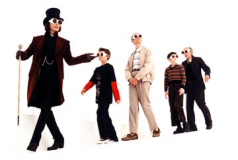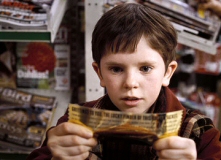Charlie and the Chocolate Factory (Tim Burton, 2005)
 Tim Burtonís Charlie and the
Chocolate Factory, an adaptation of Roald Dahlís beloved, nasty
childrenís classic is an imperfect film, though it fares better than Willy
Wonka and the Chocolate Factory, the first film made from the source novel.
The title change that marked Wonkaís first transition to screen
almost seemed
appropriate, since Gene Wilderís stagy, slightly unnerving performance as that
crazed candyman was one of the few worthwhile aspects of the production. It was
cursed with sappy interplay between its young protagonist and his family and
wholly unwelcome songs. Burtonís decision to rectify the change, and put Charlie
back in the title where he belongs, suggests that the young character takes
a more dominant role in this version of the film, but thatís only half-true.
The first act of his adaptation is indeed dominated by Charlie Bucketís
plight, transporting the viewer to an expressionistic town dominated by the
presence of Wonkaís omnipresent but out of reach factory. The expository
scenes, in which the children selected to tour Wonkaís factory are introduced,
work brilliantly. The detailing of Charlieís quest to gain entry into that
exclusive group feels a bit abbreviated, though it does much to endear the boy
to the audience. When the movie moves to the factory, however, and introduces
Wonka (Johnny Depp), the clear star of the show, poor Charlie all but evaporates
from the screen and Burtonís personal attachment to the material becomes all
too clear.
Tim Burtonís Charlie and the
Chocolate Factory, an adaptation of Roald Dahlís beloved, nasty
childrenís classic is an imperfect film, though it fares better than Willy
Wonka and the Chocolate Factory, the first film made from the source novel.
The title change that marked Wonkaís first transition to screen
almost seemed
appropriate, since Gene Wilderís stagy, slightly unnerving performance as that
crazed candyman was one of the few worthwhile aspects of the production. It was
cursed with sappy interplay between its young protagonist and his family and
wholly unwelcome songs. Burtonís decision to rectify the change, and put Charlie
back in the title where he belongs, suggests that the young character takes
a more dominant role in this version of the film, but thatís only half-true.
The first act of his adaptation is indeed dominated by Charlie Bucketís
plight, transporting the viewer to an expressionistic town dominated by the
presence of Wonkaís omnipresent but out of reach factory. The expository
scenes, in which the children selected to tour Wonkaís factory are introduced,
work brilliantly. The detailing of Charlieís quest to gain entry into that
exclusive group feels a bit abbreviated, though it does much to endear the boy
to the audience. When the movie moves to the factory, however, and introduces
Wonka (Johnny Depp), the clear star of the show, poor Charlie all but evaporates
from the screen and Burtonís personal attachment to the material becomes all
too clear.
Though the idea of a Burton / Dahl
collaboration would seem a perfect aligning of sensibilities, it becomes
incredibly apparent that the directorís pretenses get in the way of Dahlís
simpler intent. The finale in particular deviates from the book, not so much
because the film needs emotional closure, but seemingly more because Burton
himself needs to better identify with Wonka. He presents him as a tortured,
socially awkward artist, who must learn to love again to find the happiness to
create (though this hardly stopped him early on), which isnít exactly an
unwelcome sentiment, though it goes a long way toward reducing the actorís
earlier quirky effectiveness. Thereís no rule that says childrenís films
canít be serious, but the problem is that little beyond Deppís own
skittishness has prepared us for this weight. Certainly not many of Burtonís images have much to do with the filmís weightier themes.
 One exception occurs when Burton presents the image of 2001:
A Space Odysseyís iconic monolith as it is replaced with a Wonka Bar. It
becomes apparent that the filmís ulterior motive is the artistic evolution of
its creator and that of the boy who strives to emulate him. The desire to be
faithful to the bookís plot and include five songs all but squeezes the young
boy out of the second half of the film, though, and since Charlie becomes a
non-entity, this theme seems half-formed and somewhat pretentious. Deppís
Wonka is a weird conception, but is saddled with a Freudian motivation that does
no one any favors. When Wonkaís motive for running the contest is revealed, he
is still clearly a narcissist, and his rapid transformation into a caring
individual is unconvincing (and rather unwelcome). These changes provide a
redemptive spin (Burtonís obviously more sentimental than Dahl ever dreamed of
being), but one has to wonder if the Charlie-as-an-artist theme is appropriate
when the script makes it clear that heís a resoundingly average little boy
except for his strong character. Is Burton merely trying to say here that good
character is an essential requirement for mental health or is he trying to
suggest that itís the cornerstone to artistic success? I canít fathom why
heíd argue either point, but the narratorís early insistence that Charlie is
not a particularly clever or smart boy greatly undermines the theme.
One exception occurs when Burton presents the image of 2001:
A Space Odysseyís iconic monolith as it is replaced with a Wonka Bar. It
becomes apparent that the filmís ulterior motive is the artistic evolution of
its creator and that of the boy who strives to emulate him. The desire to be
faithful to the bookís plot and include five songs all but squeezes the young
boy out of the second half of the film, though, and since Charlie becomes a
non-entity, this theme seems half-formed and somewhat pretentious. Deppís
Wonka is a weird conception, but is saddled with a Freudian motivation that does
no one any favors. When Wonkaís motive for running the contest is revealed, he
is still clearly a narcissist, and his rapid transformation into a caring
individual is unconvincing (and rather unwelcome). These changes provide a
redemptive spin (Burtonís obviously more sentimental than Dahl ever dreamed of
being), but one has to wonder if the Charlie-as-an-artist theme is appropriate
when the script makes it clear that heís a resoundingly average little boy
except for his strong character. Is Burton merely trying to say here that good
character is an essential requirement for mental health or is he trying to
suggest that itís the cornerstone to artistic success? I canít fathom why
heíd argue either point, but the narratorís early insistence that Charlie is
not a particularly clever or smart boy greatly undermines the theme.
Burtonís narcissistic desire here to
normalize Wonka deflates the wonders that have come before, and I suspect that
the directorís wish to create a work with a personal message in the context of
a monolithic, mega-budget adaptation of a well-known classic novel got the
better of him. The varied images of the first act fly by quickly, which might be
why the film builds such admirable steam those early scenes. Augustus Gloopís
hairless face and Mrs. Beauregardeís intense stares at her daughter are
marvels of caricature that instantly epitomize those characters, which speaks of
Burtonís skill as a stylist as much as it illustrates what shallow characters
they are. When a more serious direction is taken, though, and Burton needs to
show us the profound emotional experiences of Charlie and Wonka, thereís next
to no stylistic shift. They feel as hollow as any of the filmís characters,
unfortunately. At one point, Charlieís says, ďCandy doesnít have to have a
pointÖ thatís why itís candy.Ē Itís a line thatís unmistakable as a
directorial mission statement. Burton wants his candy to have a point, though,
and as a result itís not that satisfying.
60
Jeremy Heilman
07.18.05